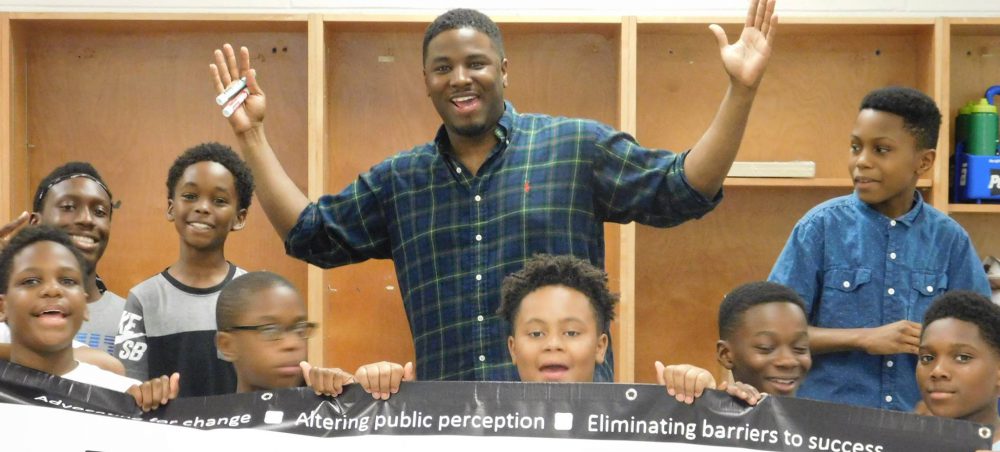When Malcolm X called white people devils, he was not talking about any one specific person. He was commenting on the evil that had been done to his people by members of America’s dominant race. Malcolm Little, the man he was before his religious and cultural awakening, had experienced all manner of devilry at the hands of people with white skin. Two of his childhood homes were burned to the ground by white supremacist groups, and he believed his father, who was a proud  Garveyite and Baptist preacher, was killed by white racists (Malcolm X, 1964).
Garveyite and Baptist preacher, was killed by white racists (Malcolm X, 1964).
So, I think it is fair to say that Malcolm X had his reasons for saying what he said. Those remarks aside, Malcolm was solely concerned with the plight of the “22 million so called Negroes in America.” As a resident of Harlem in the 1940s, he had experienced life in an impoverished community, and he and the other residents were mistreated on a regular basis. Slum lords charged high rent for run down tenements, and merchants charged high prices for inferior goods and services.
To Malcolm, the worst part about living in Harlem was that, even though black people were in the majority, they had no control over their circumstances. They were at the mercy of the property owners and the business people. Under this reality, Malcolm knew that Black people needed a new way of doing things. So, he preached a new philosophy – the economic and political philosophy of Black Nationalism.
 According to Malcolm X “The political philosophy of Black Nationalism only means that if you and I are going to live in a Black community – and that’s where we’re going to live, cause as soon as you move …out of the Black community into their community, it’s mixed for a period of time, but they’re gone and you’re right there all by yourself again – we must understand the politics of our community and we must know what politics is supposed to produce.”
According to Malcolm X “The political philosophy of Black Nationalism only means that if you and I are going to live in a Black community – and that’s where we’re going to live, cause as soon as you move …out of the Black community into their community, it’s mixed for a period of time, but they’re gone and you’re right there all by yourself again – we must understand the politics of our community and we must know what politics is supposed to produce.”
Malcolm X stated that “the black man should control the politics and the politicians in his own community [because] until we become politically mature we will always be mislead, lead astray, or deceived or maneuvered into supporting someone politically who doesn’t have the good of our community at heart.”
In addition to controlling politics in the black community, Malcolm also believed that black people should control black money. Malcolm said “The economic philosophy of Black Nationalism means that we should own and operate and control the economy of our community. You can’t open up a  black store in a white community. White men won’t even patronize you. And he’s not wrong. He’s got sense enough to look out for himself. You the one who don’t have sense enough to look out for yourself.” He wanted black people to open up and shop in black owned stores because that would keep our money in our community.
black store in a white community. White men won’t even patronize you. And he’s not wrong. He’s got sense enough to look out for himself. You the one who don’t have sense enough to look out for yourself.” He wanted black people to open up and shop in black owned stores because that would keep our money in our community.
He analyzed the problem saying: “When you spend your dollar out of the community in which you live, the community in which you spend your money becomes richer and richer; the community out of which you take your money becomes poorer and poorer. And because these Negroes, who have been mislead [and] misguided, are breaking their necks to take their money and spend it with The Man, The Man is becoming richer and richer, and you’re becoming poorer and poorer. And then what happens? The community in which you live becomes a slum. It becomes a ghetto. The conditions become run down. And then you have the audacity to complain about poor housing in a run-down community. Why you run it down yourself when you take your dollar out.”
Malcolm did not mince words or beat around the bush. He told black people what they needed to know and hoped they would heed his word. While trying to change the black community, Malcolm had no time to worry about people of other races. He spent his time trying to teach black people to love themselves and to invest in their communities. Teaching black people to love themselves under no circumstances translates into teaching them to hate white people.
Reference
Malcolm X. Ballot or the Bullet. Speech. Delivered 12 April 1964.
X, Malcolm & Haley, A. (1964). The Autobiography of Malcolm X. New York, NY: Ballantine Books.



